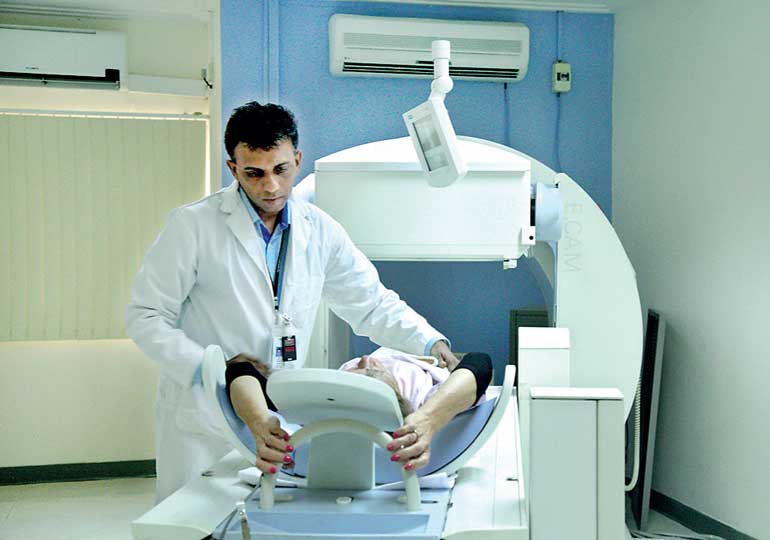Thursday Feb 26, 2026
Thursday Feb 26, 2026
Tuesday, 19 September 2017 00:00 - - {{hitsCtrl.values.hits}}

The internationally accredited, multi award-winning Lanka Hospitals Corporation PLC has always been at the forefront of cutting edge, medical technology and innovations. As a result, the dynamic hospital brand is proud to be the pioneers of nuclear medicine in Sri Lanka, being the only private hospital to offer this service.
Nuclear medicine is a branch of medical imaging that uses small amounts of radioactive material to diagnose and determine the severity of or treat a variety of diseases, including many types of cancers, heart disease, gastrointestinal, endocrine, neurological disorders and other abnormalities within the body. Because nuclear medicine procedures are able to identify molecular activity within the body, it provides the opportunity to identify disease in its earliest stages, as well as a patient’s immediate response to therapeutic interventions.
Is it safe?
Unlike common medical procedures like X-rays, nuclear medicine does not enjoy widespread use, especially in Sri Lanka, where it is underutilised and not included in the undergraduate medical curriculum. Due to the lack of knowledge on the subject, patients are typically afraid to get a nuclear medicine consultation, even when they are referred to do so by another doctor.
Speaking on the subject, Dr. Udugama, MB, BS, PhD – Consultant Nuclear Medicine at Lanka Hospitals said: “Nuclear medicine is used in a very safe manner in order to get the maximum benefit and minimum exposure to the patient. Many medical procedures like X-ray and CT use radiation to diagnose and treat patients. Before deciding to recommend nuclear medicine procedure to a patient, we first have a consultation to determine if the patient is eligible for the process and if it is really necessary. Then, we use only the highest quality pharmaceuticals in the market in our tests and the smallest dosages necessary to diagnose our patients.”
Dr. Udugama added that the use of radioactive substances (Radioisotopes) in nuclear medicine is governed by an international body, known as the International Atomic Energy Authority, which enforces strict guidelines and safety criteria. “Nuclear medicine investigations are safe to use and in many cases it helps save lives, because it helps with early detection of diseases. This means that doctors can act faster, and provide relief to patients in a shorter period of time.”
Is nuclear medicine for you?
Nuclear medicine is very commonly used to detect cancer spread, particularly cancer spread in to bone, from the breast or lung. A bone scan using nuclear medicine technologies is one of the fundamental ways in which doctors can detect diseases early enough to prescribe the most appropriate and successful treatment plan. As a result, it is helpful to get a nuclear medicine scan, along with a mammogram and similar routine medical tests. Prostate cancer is another instance where nuclear medicine can help with regard to early detection.
Further nuclear medicine is also useful in detecting sports injuries, such as those occurring as a result of over exercising, or using the wrong techniques. An MRI scan or X-Ray may not show some bone injuries, but through functional imaging techniques using nuclear medicine, it is possible to detect the slightest changes in bone structure and function.
Radioisotopes use in Nuclear medicine does not typically have any side effects with intravenous injections or radiation and it rapidly eliminates from the body. The nuclear medicine centre at Lanka Hospitals offers a wide spectrum of Nuclear Medicine Imaging and has been in operation for the past 15 years, since its beginnings in 2002. There is minimal waiting time for patients, with results being shared within a two week period.
Lanka Hospitals is currently the only private hospital in Sri Lanka to offer nuclear medicine diagnostic services. In the future, Lanka Hospitals hopes to employ nuclear medicine to go beyond diagnosis, and also be used in patient treatment.